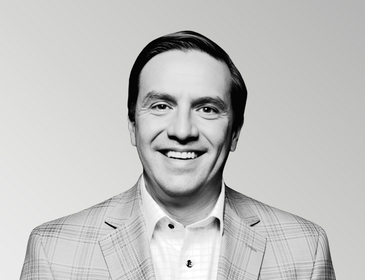Interviewed by Linnéa Jungnelius
Russell Findlay, a distinguished marketing leader, has shaped some of the most identifiable brands over the last three decades, Major League Soccer, IHOP, and PepsiCo among them. Unlike most, his success traverses sectors. He's left an imprint on industries as diverse as CPG, food & beverage, sports & entertainment, and financial services. While there's no "one-size-fits-all" answer as to how Russell has repeatedly scaled billion dollar brands, his commitment to nurturing the next generation of marketeers is a prevailing theme.
In 2021, he assumed his current operating partner and senior executive director role at H.I.G. Capital, a leading global alternative investment firm with $59B of capital under management. His work in the firm's private equity practice centers on developing and implementing marketing and digital strategies and due diligence across the portfolio. Russell plays a pivotal role in value creation, advising generalist operating partners and portfolio management alike on the power of marketing as a growth driver and proving its impact on profitability.
Russell ventured into PE from his role as global CMO of Hiscox, a $5B FTSE 100 international fintech insurance carrier, where he drove the DTC business and shaped its global footprint. He previously made history as the inaugural CMO at Major League Soccer, expanding market size by 140 percent and prompting a reevaluation of franchise market pricing strategy. His career also includes leadership roles with IHOP, PepsiCo, and Unilever.
On this episode of the Brilliant People Podcast, Russell and Linnea Jungnelius, VP of Marketing & Strategy at Acertitude, engage in a thought-provoking conversation on marketing's integral role in the value creation plan, the evolution of the portfolio operations function, and the timeless, transferable marketing principles that can be applied across thoughtful, large public corporations to energetic, emerging portfolio companies.
Marketing's value
Linnea: Russell, welcome! Over the past decade, we've seen private equity shops build out their portfolio operations teams and played a role in that work as they've sought new ways to drive strong returns. More recently, this has meant complementing generalist operating partners with specialists who offer portfolio companies expertise across all aspects of an enterprise.
Commonly, we see finance, digital, talent, supply chain, transformation, commercial and, indeed, marketing operating partners, which is the role you sit in today. From your perspective, why is marketing so important to private equity value creation right now?
Russell: Financial engineering alone isn't enough to run a sustainable business. You have to be a builder, not just a banker. You have to help build the companies and marketing is a critical function to drive growth during the hold period. Firms want higher returns, LPs want higher returns for their money, and everybody wants a quality-sponsored deal.
Until a few years ago, the industry still debated whether operating partners were a necessity or a nicety. It feels like that debate is largely settled as most large PE firms have operations groups now. It's taken time to think about and add OP positions for the different C-suite roles you think of in a portfolio company. Traditionally, finance, operations, and HR-based operating partner roles were filled first with marketing a more recent priority.
The role of marketing is to create demand. The function has naturally evolved from being viewed as a cost center to a profit center that you need to nurture. Within the last decade or so, marketing's reputation has morphed into one that drives value, and in some instances, drives top-line revenue. Many companies have developed marketing positions to read chief growth officer as opposed to chief marketing officer. The lens has changed, and eyes have opened to the truth that lies in marketing fueling the top and bottom lines.
Operating partner trends
Linnea: You mentioned that PE firms are advancing from merely bankers to builders. What other trends are you seeing as to how PE is evolving their value creation groups and overall capabilities and expertise outside of the marketing function?
Russell: A number of larger firms are investing in niche specialists that can bring value across the entire portfolio company roster. For example, data and analytics functions, which sometimes fall within the purview of deal teams themselves, are now becoming fully baked operating partner roles. To a certain degree, we are also hearing of PE shops adding ESG resources at the holdco level.
Another role we are seeing come to fruition at H.I.G. Capital and beyond is cyber. It's becoming imperative to have a dedicated resource to look after cyber threats and security in general across all portfolio companies. This is an example of specialty roles at the sponsor level that individual portcos may not have the resources to afford, but can add significant value. In this example, spreading the cost of that expert operating partner across the portcos, while protecting the fund, is good value for money.
Regarding timing, operating partners are being brought into the diligence cycle and value creation process much earlier than we would have about 12-24 months ago. The speed and complexity driving deals these days is paramount, and firms are trying to get to "yes" faster, and shorten the length of diligence as best as possible.
World-class execution
Linnea: You've spent time with large international brands like the Unilevers, PepsiCos, and IHOPs of the world. In what ways do more established brands excel in marketing, and what are the best practices that you carry over from those companies into the portfolio companies you support today?
Russell: One of the advantages of working at large, international, marketing-centric type companies is that you learn good habits, discipline, and what excellent marketing and good agency resources should look like. You learn what a good marketing operating tempo is and how fast you can run while maintaining quality and excellence. Once you get to that level of benchmarking, you can take those key learnings and apply them wherever you go, especially when looking to wire in the marketing function at a portfolio company.
Secondly, you can see many forms of marketing across a variety of channels. Most private equity is B2B. Exposure to B2C and even B2B2C allows you to view complex, omnichannel-type distribution systems and themes that you can carry over into any practice where applicable. Most of all, in large companies, marketing acts as the central hub of the organization, so you can get great insight into seeing how the company operates. All best practices can be transferable regardless of industry or company type.
Linnea: Being in private equity now, how have you adapted your approach to building brands and rolling out marketing strategies that pay off within the holding period? And, how hands-on do you like to be with the marketing leaders at the portfolio companies you support?
Russell: I look to be as hands-on as the portfolio company executives want me to be, provided I have the time that allows me to do so. At H.I.G. Capital, we take a clear approach on this:
1) We don't run portfolio companies.
2) We take a controlled position.
3) We put people on the Board to guide the company.
My role is to help make the executives at the portfolio company as successful as they possibly can be, but we don't run the show.
Outstanding leadership
Linnea: What stands out to you about the skills and traits that define great marketing leadership and great CMOs today?
Russell: In my opinion, you need to be great at a few core items.
Numbers
To be a great chief marketing officer or marketing functional head, you must have a strong command of both marketing numbers and business numbers. You have to know how to run and/or read a P&L.
Relationship building
You need to be a people person and build strong relationships with all constituents: your own functional marketing employees, company employees, stakeholders, your customers, and your consumers. Personality and connection will drive the culture internally and help other key leaders move the needle.
Storytelling
This is where the magic lies. Being able to describe the company, evoke emotion, and create connection is priceless. You should understand the story that is supposed to be told and do so in a way that's clear, concise, and compelling.
Linnea: We are living in a time of huge change for both PE and business in general. What lessons do you try to remember about leadership in times of change?
Russell: My first rule of thumb is "before you can lead others, you have to lead yourself." This framework of self-discipline is necessary if you want to be a role model for others on both personal and professional level.
I strongly believe that a leader's job is to make more leaders. Being a functional top-performer doesn't equate to being a good leader. This brings me back to the notion of mastery of the Self. The work that goes into producing great leaders is hard and oftentimes comes without reward. The process isn't codified in many companies, so you need to have the temperament and grit to train and lead people successfully. This starts from within.
You may be running the function, but at the end of the day, you have a responsibility to the craft and to your people.
Final thoughts
Private equity firms are running complex businesses and the need for leadership skills isn't a nice-to-have. It's an absolute must have. It is the job of operating partners to spend time with functional heads to instill the notion of leadership within as well as help them create an environment that is conducive to learning, growing, and catalyzing change inside the entire organization. Embodying the "builder" mindset is key to making shops thrive and positions the marketing function as a growth driver that is a necessary ingredient in the value creation plan.
Defining brilliance with Russell Findlay
 | Purpose is: | the true north of the essence of the company, and without it, there is no focal point. It is invaluable for a brand. |
 | Leadership is: | creating an environment where great teams can come together and make something special happen. |
 | Brilliant leaders are: | a combination of hungry, humble, and smart. |
 | Success is: | self-defined and subjective. People often chase a version of success that others or society has instilled in them that they think they need to go get. I think that it needs to be self-created by an individual. |
 | I perform at my best when: | I have a purpose, I am passionate about that purpose, and have some self-induced pressure. |
Never miss insights
Stay in the know with our thought leadership
Linnéa's thinking
#BrilliantPeopleAtWork
Gareth Balch: How Fan Data, Audience Growth, and Sports IP Monetization Are Reshaping the Global Sports Industry
Dec 17, 2025

#BrilliantPeopleAtWork
Brian Neider: Managing Partner at Lead Edge Capital on the Strike Zone Strategy Behind $5B of Disciplined Growth
Dec 01, 2025

#BrilliantPeopleAtWork
Dan Migala: Former Legends Co-President & CRO on Turning Creativity into Commercial Wins in Sport
Nov 17, 2025

